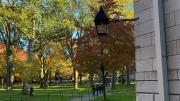The College has admitted 7.9 percent of early-action applicants to the class of 2026, slightly up from the 7.4 percent admitted from that pool last year—and well below the 13.9 percent admitted from the 2024 pool. Of the 9,406 students who applied early to the 2025 class, 740 were admitted. Last year, 743 students were selected of the 10,087 who applied early.
Continuing the relief first implemented for the class of 2025, this year’s applicants were not required to submit SAT or ACT scores. The College announced today that this test-optional policy will continue for the classes of ’27, ’28, ’29, and ’30 “due to the ongoing COVID-19 pandemic and its continued impact on access to testing for high school age students.” Whether standardized test scores will be required of applicants after those years is unclear.
“Students who do not submit standardized test scores will not be disadvantaged in their application process,” said William R. Fitzsimmons, dean of admissions and financial aid. “Their applications will be considered on the basis of what they have presented, and they are encouraged to send whatever materials they believe would convey their accomplishments in secondary school and their promise for the future.”
Among the accepted students, 12 percent come from first-generation college backgrounds (compared to 16.7 percent from last year). An additional 10.8 percent of students are eligible for Pell Grants (down from 14.5 percent last year, but up from 8.9 percent the year before).
Total cost of attendance will likely exceed $75,000 in the 2022-23 academic year (the figure is $74,528 for 2021-22), but most students will not pay that price. The College emphasized that more than half of undergraduates receive need-based scholarships. Among those receiving scholarships, the average cost of attendance is $12,700; 20 percent of families pay nothing.
The demographics of those admitted early this year vary slightly from the prior year. African Americans make up 13.9 percent of those admitted (16.6 percent last year), Asian Americans 25.9 percent (23.4 percent last year), Latinos 10.5 percent (10.4 percent last year), and Native Americans and Native Hawaiians 3.7 percent (1.3 percent last year). International students constitute 12.6 percent of students admitted so far, compared to 12.2 percent last year.
Those admitted early, on December 16, are not obligated to enroll and have until May 1 to make their final decision. The College plans to have an in-person Visitas weekend this year for accepted students—the first one since 2019.







